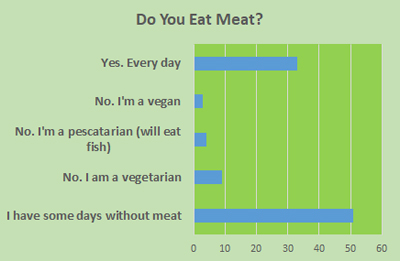How Much Meat Do Children Eat?
How Much Meat Do Children Eat?

There are many reasons to avoid eating meat. Primarily for the good of the planet. Rearing livestock eats up huge amounts of land (forests are felled to make way for cattle), fodder (land which could be used to grow food for humans is taken up to grow animal feed), energy (used for transportation, lighting, heating and processing machinery), and water (one kilogram of beef requires fifteen-thousand litres of water to produce).
With children so concerned of late with the future of the planet you might expect that a great number of them would have given up meat, or at least tried to cut down on it. So, for this week’s survey we decided to find out. We asked 4,311 schoolchildren whether or not they ate meat.
Now, this is not a “yes” or “no” style question. There are a range of possible answers from vegans to carnivores. So, to try to cover all these we offered four possible answers:
- I have some days without meat
- No. I am a vegetarian
- No. I'm a pescatarian (will eat fish)
- No. I'm a vegan
- Yes. Every day
Tiny Proportion of Children Are Vegans
Without doubt the best way to help the planet through our diet is to become vegan. Not only does this avoid all the problems associated with producing meat, but it also removes the rearing of livestock for other products, like milk, eggs or leather.
In our survey only 3% of children said they were vegans. This sounds disappointing at first – until you realise that amongst adults a mere 1.16% are vegans. So, children are leading the way with more than twice as many young vegans as older ones.
Nine Percent of Children Are Vegetarians
Second to being vegan, becoming vegetarian it the most environmentally friendly diet. It produces two and a half times less greenhouses gasses than a meat-eating diet does. One person giving up meat would have the same impact as a car being taken off the road for six whole months!
In our poll 9% of children said that they are vegetarians. That’s almost one in ten. Again, this doesn’t seem like a huge amount, except that amongst adults the figure is a much less impressive 5.7%. Once again, future generations are taking the lead on planet-friendly diets where their elders are lagging behind.
How Many Pescatarians Are There?
First of all, what exactly is a pescatarian? Well, in simple terms a pescatarian is a vegetarian who includes seafood in their diet. There are several reasons people might do this: as a steppingstone towards a totally vegetarian diet, for health reasons or as a protest about animal welfare issues in farming.
Obviously, this is not as beneficial to the environment as a fully vegetarian diet. Our oceans are under threat from overfishing. But it is a step in the right direction. In our survey 4% of children said they are pescatarians. This compares to 5% of adults. This is the first category in which adults are more prominent than children. Not necessarily a bad thing – children seem to be more committed to saving the planet but adults less so.
How Many Children Are Cutting Down On Meat?
If you can’t give up meat altogether then obviously, cutting down on it is the next best thing. So, how many children are doing so? The answer is, most of them. In our survey a massive 51% said that they have some days without meat in their diet.
Once again, the younger generation is leading the way. According to a poll conducted on behalf of Waitrose, only a third of adults are doing the same.
Just One Third of Children Eat Meat Every Day
Traditionally at least one meal a day will contain meat. Most of us (including me) were brought up on “meat and two veg” dinners. But times have changed. In our poll only a third of children eat meat every day. Compare this to the findings of consumer research group Kantar Worldpanel, whose research showed more than half of adults do so.
Children it seems are much more serious about saving the planet through their diet than adults are. This is a shame, but it is also good news. Our futures are in safe hands.
MORE CHILDREN’S SURVEYSFull Results of our "Do you eat meat?” Survey
Here are the results from the 4,311 children who answered our question "Do you eat meat?". The survey was conducted in the week ending 28th February 2021.
| Do you eat meat? | Percentage of Respondents |
|---|---|
| I have some days without meat | 51% |
| No. I am a vegetarian | 9% |
| No. I'm a pescatarian (will eat fish) | 4% |
| No. I'm a vegan | 3% |
| Yes. Every day | 33% |



